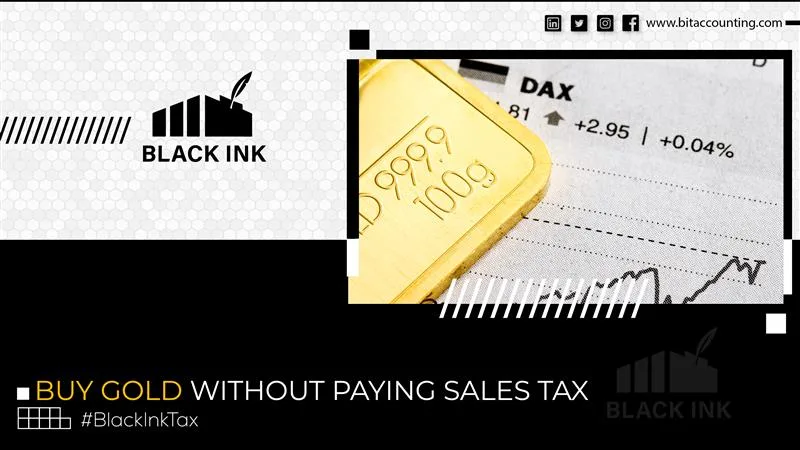
Table of Contents
How to Buy Gold Without Paying Sales Tax? Complete Guide 2025
Gold is a luxury, and without a doubt, everyone wants to own most of it. For women, it’s for wearables, and for men, mostly for collectibles. But yes, there is a big but here, with buying gold there are taxes and frankly no one likes them, but you have to pay them responsibly, but with the proper strategy, and planning you can reduce your taxes legally of course!
Here we are going to explain everything about how to buy Gold without paying sales tax and how can you minimize your overall taxes when buying gold, lets dive right into it.
What is the Price of Gold in 2025?
You should know this that in 2025 the price of gold hovers around $2,300 per ounce, going up and down cause of market forces like interest rate, geographical area, and of course the economy. However, the real price is quite changed and higher because it includes premiums, dealer fees, and often sales tax which we are here to tell how you can avoid that.
It is obvious we are talking about gold here; it’s supposed to be expensive.
If you buy a 1 oz American Gold Eagle, you might pay $2,400–$2,500 depending on the vendor and your location. Understanding this markup is the first step in calculating the true cost of investing in gold.
What Are Collectibles?
According to the Internal Revenue Service (IRS), collectibles include works of art, rugs, antiques, gems, stamps—and yes, precious metals like gold coins and bullion.
Why does this matter? Because collectibles are taxed differently from other investments. When you sell them for a profit, your gains are often subject to a 28% maximum capital gains tax rate, not the standard 15–20% for long-term capital gains.
Gold in most forms is considered a collectible unless held in a tax-advantaged account like an IRA.
Owner and Dealer Reporting
If you buy gold privately or through a dealer, you may assume it’s a private transaction. However, that’s not always the case. There are mandatory IRS reporting rules that apply under certain circumstances.
- Dealers must file Form 8300 when a buyer pays more than $10,000 in cash.
- Certain gold coin transactions must be reported using Form 1099-B.
- The IRS requires that you report capital gains when you sell gold, regardless of whether the dealer files a report.
While buying from a private individual may help avoid some reporting, it doesn’t exempt you from legal tax obligations.
Can I Sell & Buy Gold Without Paying Sales Taxes?
It’s difficult—but not impossible—to avoid paying taxes on gold legally. While sales tax can be avoided depending on your state, capital gains tax must be paid if you sell gold for a profit. Here are key tax types to understand:
- Sales Tax – Charged when you buy gold in most U.S. states.
- Capital Gains Tax – Charged when you sell gold at a profit.
- Collectibles Tax – Applies to most gold items held outside tax-advantaged accounts.
Understanding these taxes is essential before creating a strategy to minimize or delay them.
Sales Tax on Precious Metals
In the U.S., sales tax on gold varies by state. While some states charge sales tax on all bullion and coins, others offer exemptions for gold purchased as an investment.
Examples:
- No Sales Tax: Delaware, Oregon, New Hampshire, Montana
- Tax-Exempt Bullion: Texas, Florida, Arizona (only on qualifying purchases)
- Full Sales Tax Applies: California (unless the transaction exceeds $1,500)
How to Avoid Sales Tax on Gold
- Buy gold online and have it shipped to a sales tax-free state.
- Use a precious metals IRA.
- Attend out-of-state gold expos in tax-free zones.
Capital Gains Tax on Gold
If you sell gold for more than you paid, the IRS requires you to pay capital gains tax. The rate depends on how long you held the asset.
Holding Period | Tax Rate |
Less than 1 year | Normal income tax |
More than 1 year | Up to 28% (collectible rate) |
You must report the sale on Schedule D of your tax return. While you can’t avoid it entirely, you can strategically delay or reduce it with smart planning.
Tax Planning for Gold Investments
1. Avoid Physical Assets
Buying digital gold, ETFs like GLD, or futures contracts could help you avoid sales tax and reduce reporting complexity. While they come with market risk, they offer more flexibility for tax-efficient investing.
2. Hold Your Investments for at Least One Year
This qualifies you for long-term capital gains rates, which—even for collectibles—is better than paying ordinary income tax on short-term trades.
3. Consider a 1031 Exchange
Though largely eliminated for most assets, a 1031 exchange used to allow investors to defer taxes on like-kind exchanges of precious metals. While gold is no longer eligible, this is relevant for legacy investors.
4. Use Retirement Accounts
A Self-Directed IRA (SDIRA) allows you to buy IRA-eligible gold (e.g., American Gold Eagle, Canadian Maple Leaf) and defer all taxes until withdrawal.
5. Gift Gold
If you gift gold under the annual IRS gift exclusion limit ($18,000 per person for 2025), there are no taxes for the recipient. This is a powerful way to transfer wealth without triggering tax events.
6. Use Tax Loss Harvesting
If your gold has declined in value, you can sell it to realize a capital loss, which can offset other gains up to $3,000/year.

Are Gold Coins Taxed?
Yes, but how they’re taxed depends on multiple factors:
- What kind of coin it is
- How long you held it
- Where you bought/sold it
Gold coins are considered collectibles and taxed accordingly.
What Do Gold Coins Cost?
The cost of gold coins often exceeds the spot price. For example:
- American Gold Eagle 1 oz – Spot + 5–10%
- Canadian Maple Leaf – Spot + 3–6%
- South African Krugerrand – Spot + 2–5%
These premiums can include dealer markup, minting costs, and packaging.
Types of Gold Coin Taxes
- Sales Tax – Varies by state.
- Capital Gains Tax – Due when you sell.
- Gift or Inheritance Tax – If gold is transferred.
Gold Coins and Capital Gains Taxes
When you sell gold coins for more than you paid, you’re liable for capital gains tax. The rate depends on your holding period and filing status.
You’ll need:
- Purchase receipts
- Sale documents
- Schedule D form
Collectible Taxes for Gold Coins
The IRS classifies gold coins as collectibles, meaning they’re subject to a maximum 28% capital gains tax, which is higher than the standard long-term rate of 15–20%.
When Are Taxes Collected on Gold Coins?
Taxes are due when:
- You sell the coins
- You gift them above IRS thresholds
- They’re included in an estate
You won’t owe capital gains tax if you sell at a loss—but you may be able to deduct it.
Sales Tax During Purchase
Many states require sales tax on gold coins. You can avoid this by:
- Buying from tax-exempt states
- Buying in large quantities over exemption thresholds
- Using tax-free IRAs
Which Gold Coins Are Tax Free Upon Sale?
While no gold coin is inherently tax-free, you can defer or reduce taxes using strategies like:
- Holding for long term
- Selling in a low-income year
- Offsetting with losses
There is no IRS exemption for American Gold Eagles, but they are IRA eligible, which allows tax deferral.
Capital Gains Tax After Sale
Once you sell your gold coins:
- You owe capital gains tax if sold at a profit.
- Losses up to $3,000 per year can offset other income.
- Gains must be reported even if the dealer doesn’t issue a 1099.
Exceptions – Which Gold Coins Are Tax Free?
Some exceptions apply:
- Inherited coins – You receive a stepped-up basis, so only gains above that are taxed.
- Gifts under IRS threshold – No taxes for the recipient.
- Gold held in an IRA – Taxes are deferred until distribution.
Inherited and Gift Gold Coins
When you inherit gold coins, you’re not taxed right away. Instead, the value at the date of death becomes your cost basis. If you sell above that, you owe capital gains tax.
For gifts, anything under $18,000 per person (2025 limit) is exempt.
Losing Money When Selling Gold Coins
If you sell your gold coins at a loss:
- You may deduct up to $3,000 annually.
- Losses can offset gains from other assets.
This is called tax loss harvesting and is a powerful year-end strategy.
IRA Eligible Gold Coins
The IRS allows only specific coins in an IRA:
- American Gold Eagle
- Canadian Maple Leaf
- Australian Kangaroo
- Austrian Philharmonic
These coins must meet purity standards (0.995 or higher) and be stored in an approved depository.
Are American Gold Eagles Tax Exempt?
No, but they are IRA-eligible, allowing you to:
- Defer taxes until withdrawal
- Avoid sales tax (when bought via the IRA)
- Protect wealth in a tax-advantaged account
Tax Planning Tips
- Avoid short-term trades
- Use IRAs for long-term holding
- Buy in states with no sales tax
- Keep documentation
- Offset gains with losses
- Gift or inherit gold to reduce tax burden
Tax is Unavoidable, But Can Be Delayed!
Type | Details |
Short-Term | Held < 1 year – Taxed as income |
Long-Term | Held > 1 year – Max 28% |
Deductible Losses | Up to $3,000/year |
The key is not to avoid taxes illegally, but to minimize and defer them legally using smart planning strategies.
FAQs – How to Buy Gold Without Paying Sales Tax
1:Is buying gold online tax-free?
Not always. Sales tax depends on where the gold is shipped.
2: Can I buy gold anonymously?
Only under specific thresholds; large cash transactions must be reported.
3: Which states have no sales tax on gold?
Delaware, Oregon, Montana, and New Hampshire.
4: Are gold ETFs taxable?
Yes, but typically at the long-term capital gains rate, not the 28% collectible rate.
5: Can I buy gold in an IRA?
Yes, via Self-Directed IRAs with IRS-approved custodians.
GET FREE QUOTE FOR ALL OF OUR SERVICES
Black Ink will send you a free analysis of your current state and what would be the cost of managing either a separate accounting and bookkeeping services or a complete solution across New York, USA. Do get in touch and we will be happy to consult you with our bookkeeping services in NY, New York, USA.
